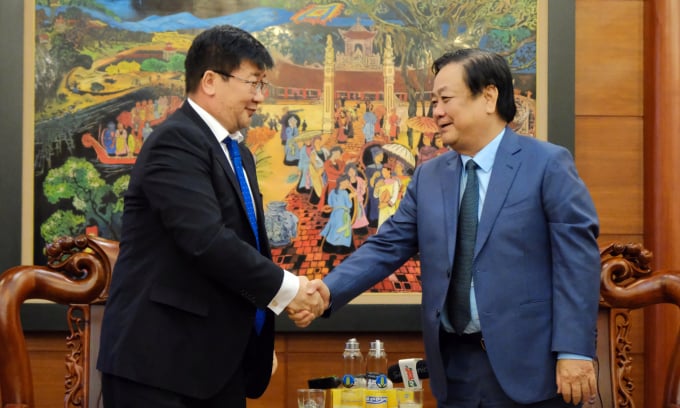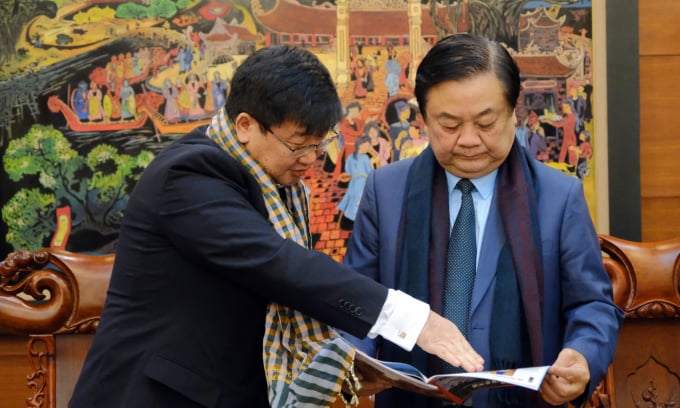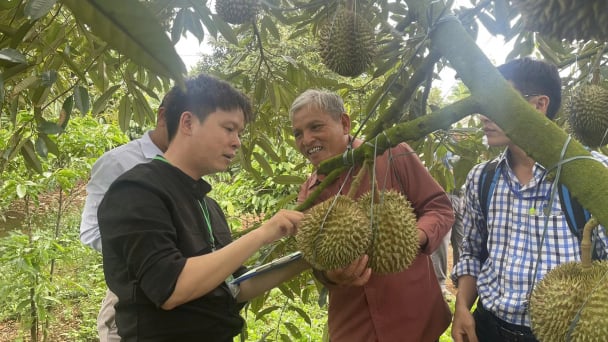May 31, 2025 | 17:09 GMT +7
May 31, 2025 | 17:09 GMT +7
Hotline: 0913.378.918
May 31, 2025 | 17:09 GMT +7
Hotline: 0913.378.918

Minister Le Minh Hoan (right) received Ambassador Jigjee Sereejav on the afternoon of April 18. Photo: Bao Thang.
On April 18, during the Mongolian Ambassador Jigjee Sereejav's reception, MARD Minister Le Minh Hoan stated that the two countries' agriculture industries are rich in traditional products that complement one another.
"I hope that the two nations would continue to expand trade and investment relations in the next years, striving to attain a two-way export turnover of USD 100 million," Minister Le Minh Hoan stated.
Vietnam-Mongolia collaboration is expanding not only in the fields of politics, security, and national defense, but also in economics, commerce, and tourism. Over the years, the two governments and enterprises have signed a number of Memorandums of Understanding to facilitate the entry of products into the two markets; he mentioned the establishment of a direct flight between Vietnam and Mongolia.
The Vietnam-Mongolia Intergovernmental Committee's meetings have reduced several barriers and boosted the two nations' economic development. This is also a point of special interest to Minister Le Minh Hoan, ahead of the 18th meeting - scheduled to be held in August 2022.
According to the Minister, in order to maximize the effectiveness of the Intergovernmental meeting session, the two sides should host a forum in June or July that brings together firms from both countries. This would be an incredible opportunity for the two parties to get to know one another while also exploring new areas of cooperation.
"With globalization advancing at a rapid rate and 4.0 technology penetrating every aspect of life, the two nations should expand the scope of collaboration, so that it is not limited to the two countries' borders but may also extend to other surrounding countries "Minister Le Minh Hoan stated.
Mongolia's export strength is in meat and processed meat products. According to Mr. Nguyen Van Long, Vice Director of the Department of Animal Health, Vietnam can accept some processed meat products from Mongolian cows, goats, and sheep.
However, during the negotiation process, Vietnam identified three significant issues with this market. One is the capacity to diagnose animal diseases. Second, Mongolia has a variety of animal diseases that have never been seen in Vietnam or other Southeast Asian nations. Third, the two nations' system of animal quarantine certifications for export still has certain issues of disagreement.
Mongolia is now seeing a demand for frozen meat exports to Vietnam. Animal health units from the two nations are enhancing their collaboration to assure the quality of food, as well as food safety and engine, in compliance with international standards and the two countries' quarantine procedures.

Ambassador Jigjee Sereejav (left) introduced some news about the Vietnamese market in the Mongolian press. Photo: Bao Thang.
Ambassador Jigjee Sereejav expressed gratitude for the warm welcome shown by the representatives of the Ministry of Agriculture and Rural Development, noting that Mongolia is a longstanding rice trade partner of Vietnam and has a need to experiment with growing this crop in the border area, contributing to the country's food security.
In terms of meat goods, the Mongolian Ambassador said that a prominent Vietnamese firm has proposed that its counterpart import frozen goat meat for use in 63 provinces and cities. He also advised that the Vietnamese government support processing technologies for some of Mongolia's most valuable exports and expedite approval of frozen meat imports.
"Over the last two years, we have been staggered by Covid-19. We agree on the importance of improving virtual meetings with Vietnam. If frozen cow meat can be shipped to Vietnam, the two-way trade would undoubtedly exceed USD 100 million," Ambassador Jigjee Sereejav stated.
While there are several opportunities for collaboration, the Mongolian side acknowledges some constraints in disease management and the unification of export animal quarantine certifications. Mr. Jigjee Sereejav proposed establishing an import-export joint venture between the two countries to resolve the issue. This unit will be aided by processes and regulations ranging from raw material sources to processing and post-harvest technologies.
Additionally, there is a free economic zone along the Russia-Mongolia border. From here, goods may be shipped to a number of former Soviet Union countries. This is a region that the Mongolian Ambassador compared to a "new market" for several Asian countries, including Vietnam.
Listening to opinions, Minister Le Minh Hoan commented that cooperation between Vietnam and Mongolia is increasingly open and substantive. "With the trend toward multilateralization, countries should connect in order for their citizens to inherit the benefits of close collaboration," the Minister said.
Mr. Hoang Trung, Director of the Plant Protection Department, stated that the majority of agricultural goods shipped to Mongolia are dry, such as rice, pepper, and cashews, as well as certain canned items such as dried bananas and canned melons.
Vietnam, the world's largest supplier of fresh fruit, has not yet introduced this item to Mongolia. According to Mr. Hoang Trung, the core problem is the geographical distance (up to 3,000 km).
Another point cited by the leader of the plant protection industry is the two nations' 2002 ratification of the Agreement on Quarantine and Plant Protection. "Many things have changed in the last two decades. We urge that the government and key stakeholders work together to ratify a new agreement, which would aid in the promotion of agricultural product import and export activities "Director General Hoang Trung stated.
Translated by Linh Linh

(VAN) For the durian industry to succeed, the value chain must fulfill its commitments to the government, the community, and international partners.

(VAN) Vaccinating juvenile pangasius helps reduce disease, antibiotic use, and farming costs, increasing profits for export-oriented farmers in An Giang.

(VAN) Due to a limited supply of workforce and competitive recruitment requirements, businesses struggle to retain talented veterinary human resources.

(VAN) WOAH’s guidance aims to mitigate disease risks through a One Health approach that balances economic, conservation, and public health interests.

(VAN) Ms. Nguyen Thi Dung, Deputy Director of Ngoc Hoang Cooperative, shared about the journey of bringing dragon fruit to Europe, achieving annual revenues in the billions of VND.

(VAN) Bamboo products from Thang Tho Bamboo Cooperative have reached many countries around the world, while also creating jobs for local workers.

(VAN) The Management Board of Con Dao National Park reported that a green sea turtle, tagged in the Philippines, has traveled thousands of kilometers to lay 84 eggs on Bay Canh Islet.